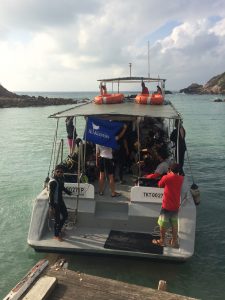Marine Clean Up and Coral Rescue
 On March 13th, 2018, 24 volunteer divers traveled from Laguna Redang Island Resort to Terumbu Kili, located within Redang Island Marine Park in Terengganu, Malaysia, with a mission to undertake a Marine Clean Up and Coral Rescue.
On March 13th, 2018, 24 volunteer divers traveled from Laguna Redang Island Resort to Terumbu Kili, located within Redang Island Marine Park in Terengganu, Malaysia, with a mission to undertake a Marine Clean Up and Coral Rescue.
Covering an area of 119 sq. m, the participating divers successfully removed a total of 130 pieces of marine debris weighing over 10.45 kgs. During the 40 minutes dive, 91 pieces of fishing lines which were tangled within the pristine coral reefs were cleared, with no observations of animals tangled.
All debris were collected and transported back on land for weighing, sorting and proper disposal according to the guidelines set out from Project Aware. The data collected is now available online on Project AWARE’s Dive Against Debris®, a citizen-science programme that contributes to the global effort to combat marine debris.
Helping Hands at Redang Island Marine Clean Up and Coral Rescue mission was co organized by the International SeaKeepers Society, Asia and Laguna Redang Island Resort. The event was supported by the Universiti Terengganu Malaysia (UMT) and Our Singapore Reefs.
Under guidance from researchers of the Universiti Malaysia Terengganu (UMT), the volunteer divers also were assisted to plant 100 rescued coral nubbins on bases before relocating them to the Laguna Redang Island Resort’s coral nursery to safeguard the corals and encourage survival and the growth rate of the broken coral by providing a stable substrate.
Laguna Redang Island Resort has committed to a two year rehabilitation programme lead by UMT‘s Dr. James Tan to restore the degraded reef in selected areas of Redang Island. This will be achieved through a programme of growing coral nubbins to improve the coverage of the coral reefs once the transplanted fragments grow and survive.
Commented Dr. Tan, “the reefs at Redang have also experienced a reduction in coral cover due to various causes. Previous studies have shown that damaged reefs progressively recover after being restored via good management. Reef rehabilitation has been practiced for many years and coral transplantation is a tool to assist in rebuilding damaged reefs thus enhancing reef recovery.”
To further create awareness and deeper understanding of the state of our marine environment, the participating UMT lecturers conducted a series of public talks that centered on marine conservation ranging from coral reefs and its value, marine debris, the impact to coral reefs from marine pollution caused by personal care products and the advanced techniques of identifying stress on coral.

You must be logged in to post a comment.